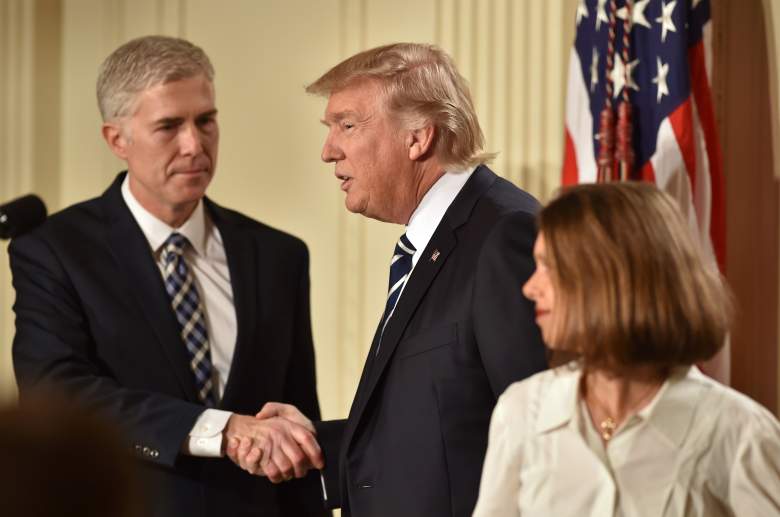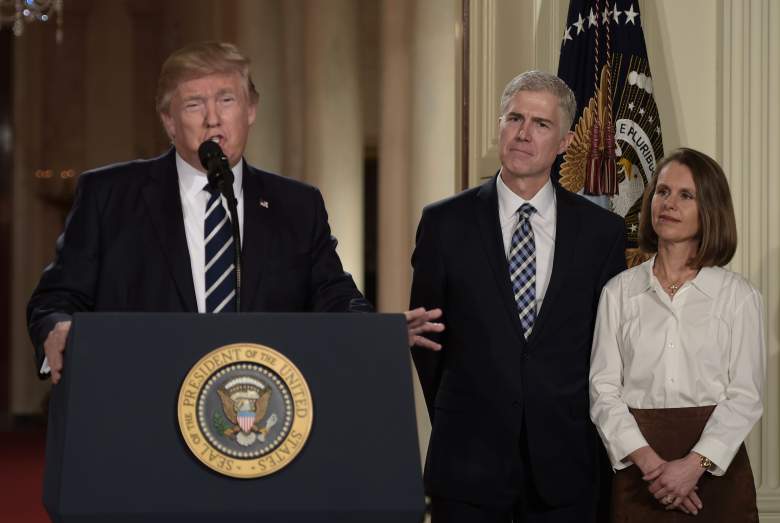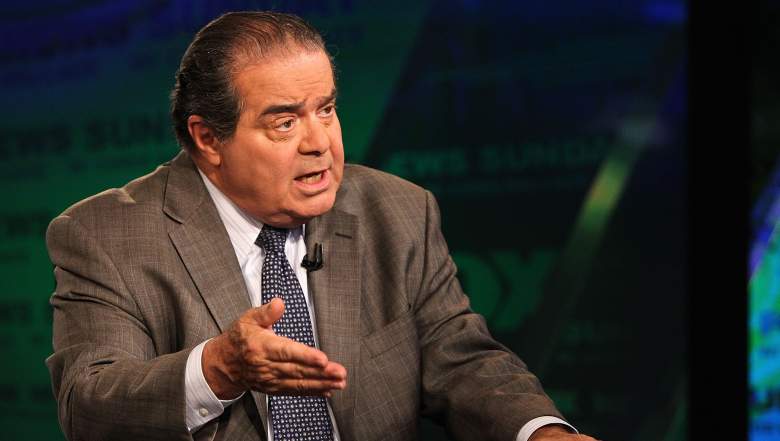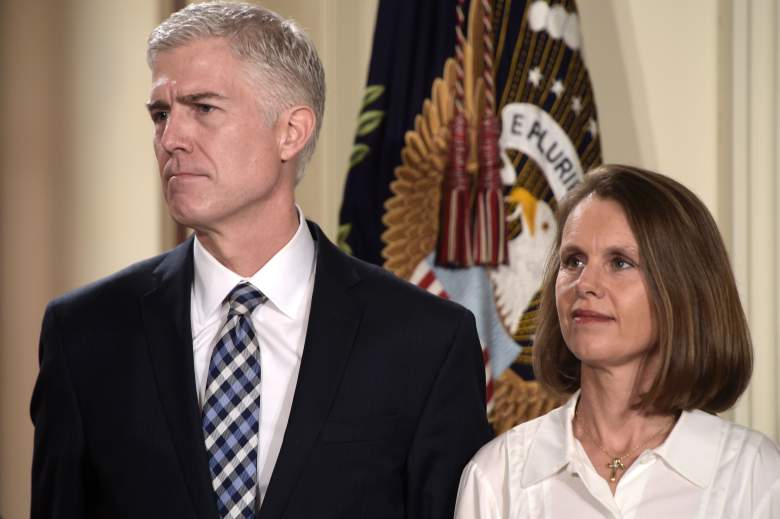
Judge Neil Gorsuch (L) shakes hands with US President Donald Trump after he was nominated for the Supreme Court, as his wife stands nearby. (Getty)
Donald Trump’s nominee to the U.S. Supreme Court, Neil Gorsuch, is known for his intellectual and eloquent writings.
Gorsuch, 49, a Denver appellate judge, has also given some noteworthy speeches. In addition, Gorsuch wrote a book on assisted suicide and euthanasia.
Simply put, there’s a lot to paw over when it comes to things that Gorsuch has written and said.
Here’s a sampling:
At His Nomination Press Conference

Judge Neil Gorsuch. (Getty)
Trump announced his selection of Gorsuch at a live press conference on January 31. Gorsuch then gave a brief press statement. You can watch it here:
Here are some of the things he said:
You’ve entrusted me with the most solemn assignment. Standing here in a house of history, and acutely aware of my own imperfections, I pledge that if I am confirmed, I will do all my powers permit to be a faithful servant of the Constitution and laws of this great country.
He also lavished praise on the American system of government.
The Supreme Court’s work is vital not just to a region of the country but to the whole. Vital to the protection of the people’s liberties under law and to the continuity of our Constitution. The greatest charter of human liberty the world has ever known.
On former Supreme Court Justice Byron White:
He was one of the smartest and most courageous men I’ve ever known.
On how he sees a judge’s role:
In the balance of my professional life, I’ve had the privilege of working as a practicing lawyer and teacher…practicing in the trial work trenches of the law, I saw too that when we judges don our robes it doesn’t make us any smarter. But it does serve as a reminder of what’s expected of us. Impartiality and independence. Collegiality and courage.
On the role of Congress vs. the judiciary:
In our legal order, it is for Congress, not the courts, to write new laws… a judge who likes every outcome he reaches, is very likely a bad judge, stretching for results he prefers, rather than those the law demands.
On the things that matter most to him:
I am so thankful tonight for my family, my friends, and my faith. These are the things that keep me grounded at life’s peaks and sustain me in its valleys.
On Late Justice Antonin Scalia

Antonin Scalia. (Getty)
Gorsuch was a big fan of the late firebrand justice Antonin Scalia, whom he would replace on the court. He spoke about how much he misses Scalia during his nomination press conference.
After Scalia died, Gorsuch gave a speech at Case Western Reserve University Law School, in which he praised Scalia.
According to a full text of the speech, Gorsuch said, in part:
He really was a lion of the law: docile in private life but a ferocious fighter when at work, with a roar that could echo for miles. Volumes rightly will be written about his contributions to American law, on the bench and off. Indeed, I have a hard time thinking of another Justice who has penned so many influential articles and books about the law even while busy deciding cases.
He also said that the “great project of Justice Scalia’s career was to remind us of the differences between judges and legislators.” Gorsuch continued:
To remind us that legislators may appeal to their own moral convictions and to claims about social utility to reshape the law as they think it should be in the future. But that judges should do none of these things in a democratic society. That judges should instead strive (if humanly and so imperfectly) to apply the law as it is, focusing backward, not forward, and looking to text, structure, and history to decide what a reasonable reader at the time of the events in question would have understood the law to be – not to decide cases based on their own moral convictions or the policy consequences they believe might service society best.
He then quoted Scalia as saying, “If you’re going to be a good and faithful judge, you have to resign yourself to the fact that you’re not always going to like the conclusions you reach.”
On Religious Freedom

A Hobby Lobby store is seen on June 30, 2014 in Plantation, Florida. (Getty)
Some of Gorsuch’s most memorable writings have been on religious freedom cases, especially the case in which he sided with the owners of the Christian firm Hobby Lobby when they did not want to offer some contraceptives to employees under Obamacare because of their faith.
Here’s what Gorsuch wrote in that decision:
No doubt, the Greens’ religious convictions are contestable. Some may even find the Greens’ beliefs offensive. But no one disputes that they are sincerely held religious beliefs. This isn’t the case, say, of a wily businessman seeking to use an insincere claim of faith as cover to avoid a financially burdensome regulation.
He continued that the Religious Freedom Restoration Act, “doesn’t just apply to protect popular religious beliefs: it does perhaps its most important work in protecting unpopular religious beliefs, vindicating this nation’s long-held aspiration to serve as a refuge of religious tolerance.”
He raised the case of an Amish employer who refused to pay social security taxes.
It is not for secular courts to rewrite the religious complaint of a faithful adherent, or to decide whether a religious teaching about complicity imposes ‘too much’ moral disapproval on those only ‘indirectly’ assisting wrongful conduct. Whether an act of complicity is or isn’t ‘too attenuated’ from the underlying wrong is sometimes itself a matter of faith we must respect.
On His Wife & Daughters

Judge Neil Gorsuch (L) and his wife Marie Louise look on, after US President Donald Trump nominated him for the Supreme Court, at the White House in Washington, DC, on January 31, 2017.
Trump named Judge Neil Gorsuch as his Supreme Court nominee. (Getty)
Neil Gorsuch is the author of a book called, “The Future of Assisted Suicide & Euthanasia.”
In the book’s dedication, he thanked his wife, Louise, and their two children. He wrote:
Finally, and borrowing in part from P.G. Wodehouse, I thank my wife, Louise, and my daughters, Emma and Belinda, without whose constant love and attention this book would’ve been finished in half the time – but without whom life wouldn’t been half as fully lived.
P.G. Wodehouse was a 20th century English author and humorist.